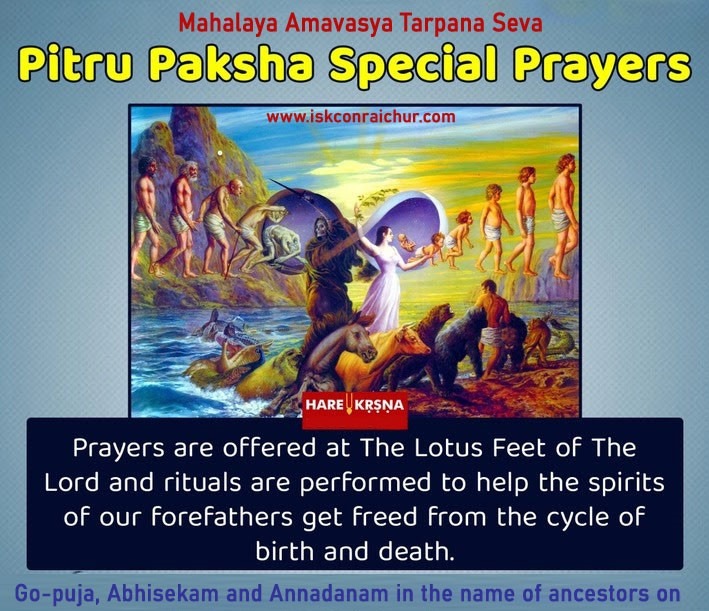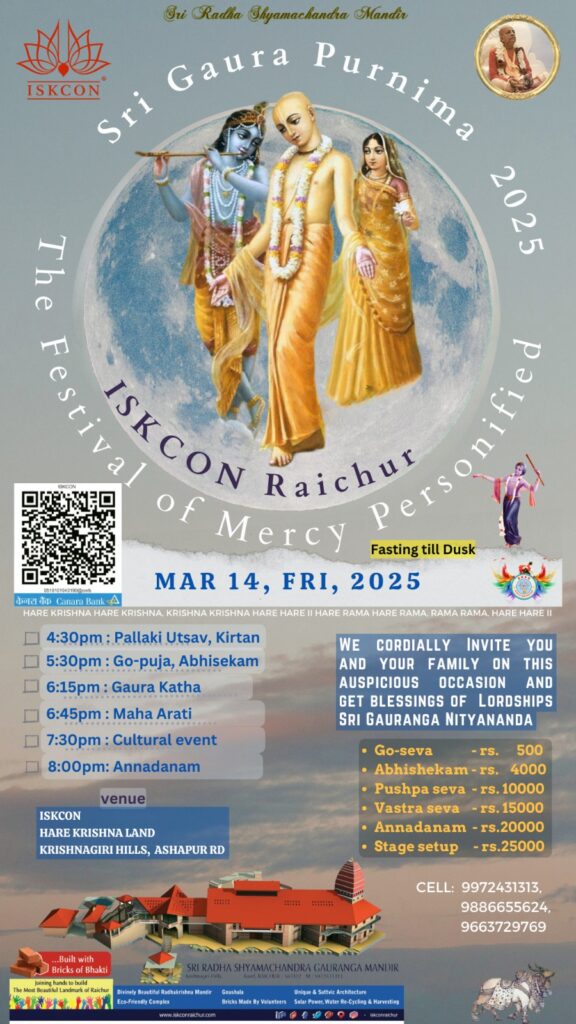
Honoring Our Ancestors
What is Pitr̥ Pakṣa?
Pitr̥ Pakṣa (literally, “Fortnight of the Ancestors”) is a sacred 15-day period in the Hindu calendar, usually falling in the month of Bhādrapada (September–October).
During this time, devotees express gratitude to their departed forefathers (pitṛs) through rituals, prayers, and charitable acts. It is seen as a bridge between the living and the departed, acknowledging the eternal bond of the soul beyond bodily existence.
The scriptures state that those who neglect their ancestors face obstacles in life, while those who honor them receive blessings for prosperity, longevity, and spiritual advancement.
Scriptural Significance
- The Mahābhārata narrates that when Karṇa departed this world, he received heaps of gold and jewels instead of food in the afterlife. Surprised, he asked Yamarāja the reason. Yamarāja explained that though Karṇa donated generously during his life, he never offered food and water to his ancestors. Moved by Karṇa’s request, Yamarāja allowed him to return to Earth for 15 days to perform śrāddha rituals. These days came to be observed as Pitr̥ Pakṣa.
- In the Garuda Purāṇa and Vishnu Smṛti, it is mentioned that by offering food, water, and charity to brāhmaṇas and the needy, one satisfies not only the ancestors but also the devas.
- The Bhagavad-gītā (9.25) highlights: Pitṝn yānti pitṛ-vratāḥ – Those who worship the ancestors go to the ancestors.
By performing these rites with devotion to Lord Viṣṇu, one ensures the upliftment of ancestors and personal liberation.
Practices During Pitr̥ Pakṣa
- Śrāddha – Offering cooked food (often including kheer, rice, dal, vegetables) to qualified brāhmaṇas in memory of departed forefathers.
- Tarpaṇa – Offering water with sesame seeds while chanting the names of ancestors.
- Dāna (Charity) – Donating essentials such as food grains, clothing, cows, and money to brāhmaṇas, temples, and the needy.
- Fasting and Prayer – Devotees often observe simple diets, chant the holy names of the Lord, and pray for the upliftment of all departed souls.
Benefits of Observing Pitr̥ Pakṣa
- Blessings of Ancestors – Peace, prosperity, and harmony in family life.
- Removal of Pitṛ Doṣa – Neutralizes negative karmic effects that arise from unfulfilled duties toward ancestors.
- Spiritual Advancement – Pleasing both ancestors and Lord Viṣṇu, devotees gain inner purity and progress toward liberation.
- Universal Welfare – Offering food and charity benefits not only one’s ancestors but also the hungry, animals, and society at large.
Recommended Donations During Pitr̥ Pakṣa
The scriptures glorify the following donations:
- Food grains, fruits, vegetables, and sweets.
- Clothes, umbrellas, footwear, and bedding for the needy.
- Feeding cows and offering go-sevā (cow protection).
- Supporting temples, brāhmaṇas, and Vaiṣṇavas.
- Distributing prasāda in memory of ancestors.
Among all charities, donating with devotion to Lord Kṛṣṇa and His devotees is considered the highest, as it purifies both giver and receiver.
A Vaiṣṇava Perspective
While performing rituals for ancestors, Gauḍīya Vaiṣṇava ācāryas remind us that the best offering is harināma-saṅkīrtana and prasāda distribution.
By dedicating kīrtana, devotional service, and offerings to Śrī Kṛṣṇa for the benefit of our forefathers, we help them attain eternal welfare, beyond temporary material blessings.
Śrīla Prabhupāda often recommended that instead of elaborate karmakāṇḍa rituals, devotees should perform harināma, bhāgavata-śravaṇa, and prasāda distribution during Pitr̥ Pakṣa, which bestows eternal benefit to both ancestors and descendants.
Donations
Frequently Asked Questions (FAQ)
1. Can women perform Śrāddha?
Traditionally, the eldest son performs Śrāddha. However, if no male descendant is present, women (or daughters) may also perform offerings, especially tarpaṇa, with sincerity. The Lord accepts devotion above all formalities.
2. What if I don’t know the names of my ancestors?
One can simply offer food, water, and prayers to the “unknown ancestors” by saying mātā-pitṛ-purvāḥ pitaraḥ (forefathers, known and unknown). Lord Viṣṇu carries the offering to them.
3. Can non-vegetarian food be offered in Śrāddha?
No. Scriptures strictly prescribe sāttvika (pure vegetarian) food, ideally prepared as prasāda for Lord Viṣṇu. Non-vegetarian offerings displease the pitṛs and create sin for the performer.
4. What if someone cannot afford donations?
Even a simple offering of water with sesame seeds and heartfelt prayers is effective. Additionally, chanting the holy names (Hare Kṛṣṇa mahā-mantra) and distributing prasāda is considered the highest charity.
5. Do ancestors really receive these offerings?
Yes. Śāstras describe that offerings made with devotion, through the medium of Lord Viṣṇu, reach the pitṛs wherever they are—be it higher planetary systems, earthly rebirth, or other realms.
Common Misconceptions About Pitr̥ Pakṣa
❌ “Pitr̥ Pakṣa is inauspicious.”
✔ In reality, Pitr̥ Pakṣa is a time of gratitude and blessings. Far from being “unlucky,” it is spiritually uplifting when observed properly.
❌ “No new work or weddings should be done.”
✔ The scriptures do not prohibit auspicious activities; rather, they encourage balance. Since focus is on remembrance and charity, families often avoid major celebrations out of respect—not because it is forbidden.
❌ “Śrāddha must be elaborate or very expensive.”
✔ Not true. Even simple offerings of water, sesame seeds, and heartfelt prayers are accepted by the ancestors when done with devotion.
❌ “Only brāhmaṇas benefit from these rituals.”
✔ The real beneficiaries are the ancestors and the family. Feeding brāhmaṇas or devotees is only a medium. Ultimately, it is Lord Viṣṇu who delivers the blessings.
❌ “Women and unmarried people cannot perform Śrāddha.”
✔ Anyone can perform sincere offerings when necessary. Devotion, not gender or marital status, is the deciding factor for the Lord.
Conclusion
Pitr̥ Pakṣa is not a time of fear, but of gratitude and service. By remembering our forefathers, performing charity, chanting the holy names, and offering prasāda, we honor our lineage and ensure blessings for generations to come.
“By serving the ancestors through devotion to Lord Viṣṇu, one pleases both the pitṛs and the devas, and one’s entire family line is uplifted.” – Garuda Purāṇa


